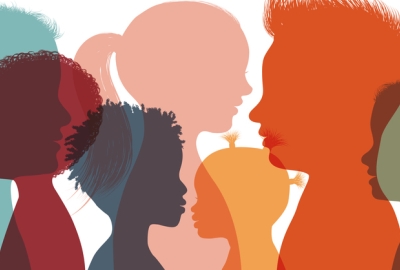
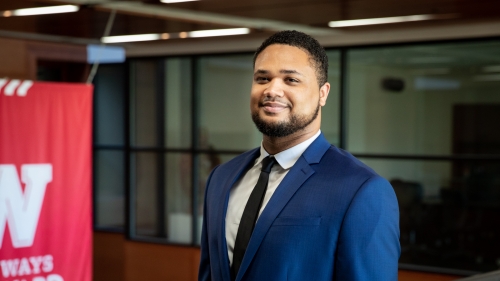
Josh Wallace is currently a Ph.D. student in the Educational Leadership & Policy Analysis program at the University of Wisconsin-Madison and pursuing a doctoral minor in Gender and Women Studies. Josh also serves as a Research Associate in the Wisconsin Equity & Inclusion Laboratory (Wei LAB). Additionally, he serves as a Project MALES graduate scholar. Josh holds a bachelor's degree from Emporia State University and a master's degree from the University of Missouri-Kansas City.
His research uses qualitative methodologies and Black feminist theoretical frameworks to (1) critically examine Black masculinities in higher education and (2) investigate how Black men in engineering develop their identities (e.g., race, gender, academic discipline).
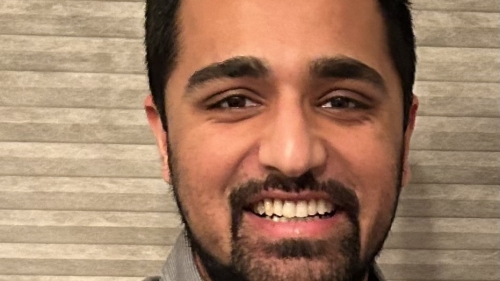
As a child, Ali and his family immigrated to the United States from Pakistan and settled in Englewood, New Jersey. As a proud New Jerseyan, he earned his Bachelor's degree in Biological Sciences at Rutgers University–New Brunswick, followed by a Master's degree in Biological Science Education at the Rutgers Graduate School of Education. After graduating, he taught high school biology and also worked at Khan Academy as a biology content fellow.
Currently, he’s a PhD candidate in the SESAME program at UC Berkeley where his research focuses on how we can make undergraduate STEM education more inclusive, interpersonal, and interdisciplinary. He specializes in assessment, evaluation, and design-based research. In his dissertation research, Ali is measuring the development of "Innovation Skills" in undergraduate students taking a course called "Bioinspired Design." In this course, students work in collaborative, interdisciplinary teams to solve design problems in society with design solutions inspired by nature.
Ali is a practicing Muslim and firmly believes in the mutually reinforcing nature of Islam and science. In his free time, he loves watching and playing sports, so you can catch him on the basketball court missing wide-open shots or turning off the TV in frustration as his favorite teams (Nets & Mets) maintain their mediocrity.
My research focuses on the assessment of student learning within a project-based course called “Bioinspired Design.” In this course, open to all majors and all years, students work in interdisciplinary teams to translate authentic scientific discoveries from primary literature into societally beneficial bioinspired designs. I’m interested in research questions such as: How do we know this course is actually working? Is it working for all students? What can we measure to support this? Why should we measure that and not something else? How should we measure this? These questions stem from the fact that educators inevitably face the task of preparing students for future careers that do not yet exist. A recent report by the National Bureau of Economic Research stated that 74% of employment amongst professionals in 2018 was found in job titles that did not exist in 1940 (Autor et al., 2022). Thus, educators at all levels of teaching are faced with a pressing question—how do we prepare the students of today for the unknown jobs of tomorrow? As science educators, it is imperative that we prepare all students, STEM and non-STEM, for future workforce pivoting through pedagogy that promotes the development of transferable STEM skills (NASEM, 2021). One of the most critical skills needed in the future is innovation. The ability to innovate has consistently been ranked as the most important skill for the future workforce (WEF, 2020) and thus, it is crucial for us to not only foster this skill in undergraduate students, but also robustly assess the development of this skill. To this end, my specific assessment research focuses on developing and measuring “Innovation Skills” in undergraduate students as they progress through the “Bioinspired Design” course. I utilize an assessment framework based on the Four Building Blocks of Assessment (Wilson, 2023) to develop and validate instruments that measure student growth. Through this “scientific approach to assessment” (Bhatti et al., 2023), I use construct modeling and statistical analyses based on item response theory (IRT) to assess the development of students’ “Innovation Skills.” Importantly, I recognize that student development occurs within both the cognitive and affective domains of learning, and thus, my assessment research measures both of these overlapping perspectives.
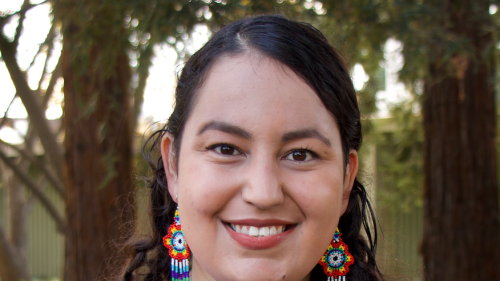
Mayra is a 4th year PhD student in the School Organization and Education Policy emphasis at the University of California, Davis. She immigrated from Sinaloa, México at the age of six and was raised in California’s South San Joaquin Valley where she worked alongside her mother in the agricultural fields. As a former college access advisor and high school biology teacher, her work with farm-working, rural communities has directly influenced her research interests. As an undocumented, first-generation Latina, she is accountable for addressing the educational inequities that impact college access, retention, and completion for Latina/o/x students in rural areas. She received her bachelor’s degree in Biology from the University of Pennsylvania in 2016.
Scholarship on higher education issues has not prioritized the experiences around college access for rural Students of Color, despite the spatial inequities in higher education institutions. Thus, my dissertation titled “Access to What and for Whom? Examining the Transfer College (In) Opportunities for Rural Latina/o/x Students” seeks to move beyond recognizing that racial disparities exist in community college transfer to questioning the role that geography and institutional factors may play in perpetuating these inequities. Understanding how to better support these communities is critical, as rural communities are often excluded from national conversations around education, and issues in rural higher education are rarely explored. Using quantitative and qualitative methods, I employ critical interdisciplinary frameworks, such as critical race spatial analysis, proximity theories, and geography of college opportunity to explore the 1) variation in the transfer rates of Latina/o/x community college students by geographic locale (rural, town, suburban, urban) across California, 2) how institutional and structural factors influence Latina/o/x student community college transfer among rural community colleges and 3) how rural serving community colleges in California’s San Joaquin Valley facilitate transfer for rural Latina/o/x students. This study's findings can inform programs, practices, and policies that support rural Latina/o/x students to successfully transfer to 4-year institutions.
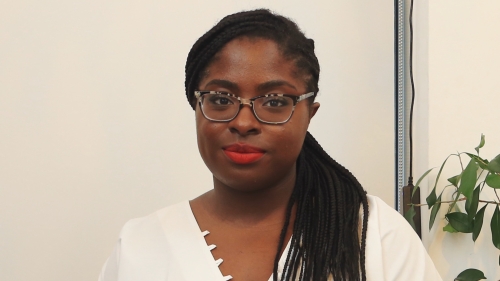
I am a fourth-year Ph.D. candidate and critical platform studies scholar at the University of North Carolina at Chapel Hill. I am originally from New York City and completed my undergraduate degree in English and African-American studies at the University of Virginia. My research and teaching is concerned with how our everyday media habits and engagement with popular culture are imbued with histories and systems of power. Additionally, I am a writer who has been featured in The Fashion and Race Database, Flow Journal, and The Daily Tarheel. Outside of school, I am a lover of art, travel, and really good food.
My dissertation looks at modern-day forms of techno-minstrelsy that animate the influencer industry, and its relationship to beauty capital in the United States. Specifically, I argue that, while minstrelsy and blackface have a specific history, newer technologies, such as the algorithms and affordances of social media, enable the continuation of minstrel practices in online spaces that reproduce racialized economic logic. I am interested in how this history of minstrelsy extends to the contemporary , where “ideal” users—those who copy, embody, and perform Blackness for white audiences—play on America’s appetite for Black culture while continuing to reject the Black body itself. I frame this analysis of techno-minstrelsy by positioning it within beauty capital, which I approach as a framework through which we can theorize the importance, economic capacity, and racial implications of beauty. Though much has been written on the ways that whiteness and beauty have created aesthetic hierarchies, scholarship around influencers—while critiquing neoliberal and meritocratic logics that especially account for gender and labor—have often failed to consider the importance of race. Therefore, my goal is to put influencer studies in conversation with critical race studies to consider the ways hierarchies of race and racialized aesthetics permeate and organize even techno-social spaces that are considered ‘diverse’ or agentic. I am especially interested in mapping how “ideal” users benefit from their beauty capital in ways that mirror and reinforce social hierarchies of racialized economic and social success and contend with the ways that techno-minstrelsy is sustained through platform affordances and algorithms. I offer the appropriation of Jalaiah Harmon’s “Renegade” dance by Charli D’Amelio as a case study that demonstrates these tensions.
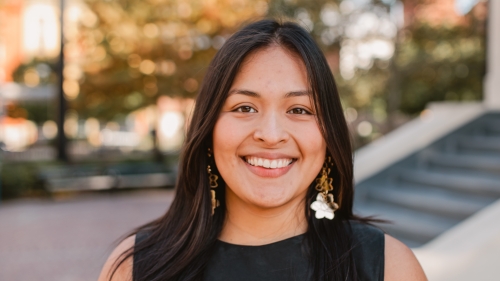
Angie Torres-Beltran is a PhD Candidate in the Department of Government at Cornell University. Her research interests include the comparative study of gender, violence, political participation, state-society relations, and justice in Latin America (Mexico, in particular) and the US. Her dissertation examines local and gendered state-society relations and their consequences for political behavior and responsibilities. Her work has been supported by the Advancing Research on Conflict Consortium, the American Political Science Association, and the National Science Foundation, among others. She is also the founder of the Gender and Political Participation Graduate Working Group, a space for those studying gender and politics to share work and get feedback. Her work has been published or is forthcoming in PS: Political Science & Politics, International Feminist Journal of Politics, and The Washington Post, among others. Angie holds a B.A. in International and Global Studies from the University of Central Florida.
What are the political causes and consequences of violence against women? Although past work has demonstrated that violence affects political participation, existing work does not unpack the relationship between gendered forms of violence and political participation, examine the role of state institutions in perpetrating violence, or explore justice following gender-based victimization. My dissertation develops a novel framework for understanding gendered violence and the consequences thereof on women’s political development. First, I demonstrate that gendered violence has a two-fold effect on women’s political participation: gendered violence is negatively associated with electoral turnout among women, but at the same time, positively associated with women’s protests. This relationship is moderated by bureaucrats who revictimize women as they seek help. I then examine the historical development of gendered state institutions, emphasizing how gendered state-society relations and bureaucratic capacity via political parties fail to promote women’s political development and shift the burden of administrating justice and public goods on women. Finally, I explore the reimagination of justice in these contexts, centering women’s beliefs about shared responsibility among citizens, civil society, and the state in the provision of justice and other public goods and services. To assess these claims, I leverage both quantitative and qualitative data from 10 months of field research, including novel administrative datasets on crime reports, women’s electoral participation, and women’s protests at the municipal level, nationally-representative survey experiments, participant observation, historical case studies, and interviews with national, state, and local-level activists, bureaucrats, experts, members of civil society organizations, and victims in Mexico.
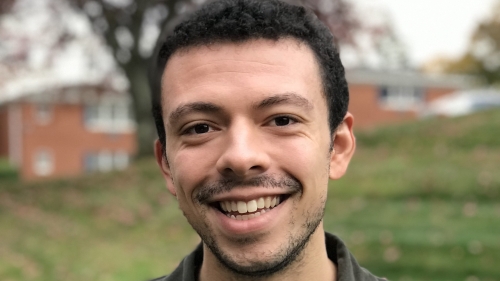
Fabian Barch is a PhD Candidate in the Sociology of Education at New York University. He obtained his bachelor’s degree in Education Studies and French from Washington University in St. Louis. He has been a part of multiple research teams that used large data to understand how teachers’ perceptions of work conditions relate to the racial composition of their classroom, and to explore racial disparities in exclusionary school discipline practices. His doctoral research explores the relationship between students’ experiences with housing instability and their academic performance. Fabian is a recipient of the American Educational Research Association (AERA) Dissertation Grant. His research interests center around questions of educational equity and race.
Homelessness is a longstanding problem that affects well over a million US students annually. Recent qualitative scholarship has explored the academic lives of unhoused students, and documented how many unhoused students face additional barriers and disruptions to their schooling. However, large-scale, quantitative inquiry on the subject is limited. My dissertation seeks to contribute this knowledge to existing literature and fill this gap. My project leverages big data to explore the effects of homelessness on the learning outcomes of unhoused students. In it, I seek to estimate the magnitude of these disruptions on students’ learning outcomes such as test scores, attendance, and disciplinary infraction frequency.
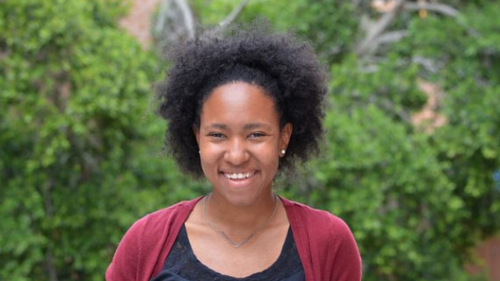
Virginia Downing is a Ph.D. Candidate in the Department of Educational Policy Studies with a doctoral minor in Qualitative Studies at the University of Wisconsin-Madison. Originally from the Kansas City, Kansas area, Virginia has more than 14 years of engaging in the intersections of community spaces and schools. Before starting the doctoral journey, Virginia maintained involvement with youth in her area through volunteering in community-based afterschool programs. Within a professional role, Virginia was an Academic Advisor and Bridge Program Coordinator at Arizona State University where she worked with both undergraduate students and prospective college students and their families in the community. During her time in Arizona, Virginia co-led summer reading programs with Black and Brown youth in the community through the public libraries. Currently, Virginia is an undergraduate instructor and a graduate researcher for two multi-year projects that examine how community perspectives and involvement in education policies can lead to equitable and anti-racist institutional systems. Virginia received her Bachelor of Science in Journalism-Strategic Communications from the University of Kansas and her Masters of Arts in Higher Education-Student Affairs from the University of Nebraska-Lincoln.
Virginia studies how community engagement, both within and outside of schools, shapes community-school relationships and informs how education reform is practiced and enacted. Drawing from scholarship within Black studies, Sociology, and Education, Virginia aims to interrogate power and organizational structures that influence community-school relationships, as well as further explore the experiences of community members across a breadth of educational spaces. Virginia’s dissertation project examines how Black community members and local school district engagement leaders within a mid-size midwestern city conceptualize community-school relationships, and how their engagement impacts sustainable relationships for education reform efforts. She has been invited to present her research at The American Educational Research Association (AERA), the Sociology of Education Association (SEA), and the University Council for Education Administration (UCEA).
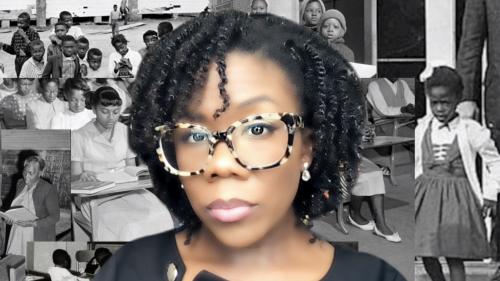
Specializing in urban politics at the intersection of race, gender, and class, Tanishia Lavette Williams is currently obtaining a Ph.D. from the Public and Urban Policy program at the Milano School of International Affairs, Management, and Urban Policy at The New School. Broadly, Tanishia’s research examines curriculum adoption (namely Culturally Responsive Pedagogy), policy, and educational disparities with a focus on the achievement and life outcomes of Black students. Based on her experience as a superintendent, executive director, principal, and teacher in school systems undergoing expansive reform, Tanishia’s focus on education aims to connect praxis and theory. Her contributions to both school-based pedagogues and contemporary literature leverage the historicity of race relations within the law to modern policy and culturalisms that impact public education. In essence, Tanishia’s scholarship examines how racism permeates systems through existing legal structures that buttress the subordination of minorities through racialized hierarchies. Tanishia looks toward serving as the Inaugural Education Stratification Postdoctoral Fellow at the Institute on Race, Power, and Political Economy at The New School. She previously served as a Critical Race Theory Senior Research Fellow with the African American Policy Forum and Center for Intersectionality and Social Policy Studies at Columbia University. Tanishia is completing her Ph.D. while concurrently obtaining a Master of Science degree in Data Visualization from the Parsons School of Design. She also has a Master of Arts degree in Emotional and Behavioral Disturbances from George Washington University and an Organizational and Educational Leadership degree from George Mason University.
Tanishia’s current research works to understand how and under what conditions Culturally Responsive-Sustaining Education (CR-SE) is implemented to yield positive results for Black children in underprivileged schools. Funded by the Walton and Spencer foundations, Tanishia’s current scholarship has focused on New York City’s most resource-deprived boroughs. Drawing from race scholars, Tanishia’s work is attentive to the inequalities that exist in education and society at large. She greatly values the contributions of scholars who urge us to examine the role that race plays in hierarchies and the existing legal structures that buttress the subordination of minorities. A critical ethnographer, Tanishia produces research that employs a qualitative analysis to capture the complex narrative of the pedagogues situated in public school spaces where the staff members have adopted culturally responsive-sustaining education. In her work, she draws on interviews, document analysis, and a variety of focus groups to investigate the strategies that staff members use for navigating teaching and learning while implementing culturally responsive sustaining education. Her multi-sited research exposes the varied tensions, contradictions, inclusions, and exclusions that co-exist in public education, focusing on a specific anti-racist intervention meant to increase student achievement among marginalized students. Tanishia’s broader research goals aim to advance the literature at the intersections of education, racial stratification, and policy. Her current public scholarship includes a variety of presentations, talks, and speeches that analyze the role of race in disparate outcomes for people of color. Last summer, Tanishia served as a core faculty member of Critical Race Theory Summer School, a symposium sponsored by Columbia University’s Center for Intersectionality and Social Policy Studies. Most recently, she published “This is the X: Building a Structurally Antiracist High School in racist America” in RACE Mentoring and P-12 Educators: Practitioners Contributing to scholarship (2022) and “Liberty Needs Glasses: A Critical Race Theory Analysis of a Culture of Miseducation in the Intersection of Power, Privilege, and Positionality” in Challenges to Integrating Diversity, Equity, and Inclusion Programs in Organizations (2021). Tanishia co-authored The Forte Way: A Coaching Case Study during the COVID-19 Pandemic (2021), a Proctor Institute for Leadership, Equity, and Justice Research Brief. In association with members of the team at InsideSchools, Tanishia published “Learning Equitably, Digitally and Well: A Report on NYC Schools in the Wake of Covid-19 and What Comes Next.” She routinely shares research and has presented at the Alumni of Color Conference at Harvard University; the Research on Women in Education Conference; The New School Conference on Management and Social Justice; the Annual Education and Development Conference (Bali, Indonesia); the Krueckeberg Doctoral Conference in Urban Studies, Urban Planning, and Public Policy; and the Critical Race Studies in Education Association Conference.
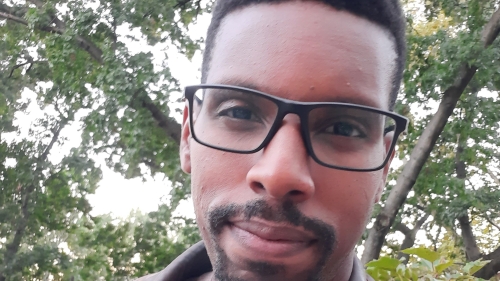
Dominic is a PhD candidate and Paul Lazarsfeld Fellow in the Department of Sociology at Columbia University. He is also a Columbia University Provost Diversity Fellow and a New York City Reducing Inequality Network Fellow. Dominic holds an MA in Sociology and Education from Teachers College, Columbia University, and a BA in Sociology from Loyola University Maryland.
Dominic's research examines questions at the nexus of identity, racial capitalism, and the cultural politics of education. His dissertation investigates the experience of youth involved with transitional school programs: non-profit organizations that recruit poor and working-class youth of color and prepare them to transition from mostly public schools in urban communities to elite, private schools. Dominic is specifically investigating how both the students and the non-profit organization make sense of moving Black and brown youth across boundaries of race, class, and space for upward social mobility.
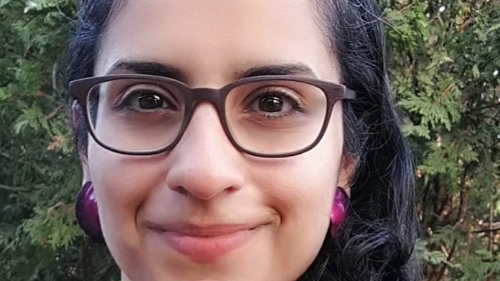
Farha Najah Hussain (she/her pronouns), M.Sc(A), SLP, is a Rehabilitation Sciences PhD candidate. Drs James McCann, EdD, CCC-SLP (Hearing, Speech, and Language Sciences, Gallaudet University); María Rosa Brea, PhD, CCC-SLP (Communicative Sciences and Disorders, NYU); Marygrace Berberian, PhD, LCAT, ATR-BC, LCSW (Art Therapy, NYU); and Nisha Sajnani, PhD, RDT-BCT (Drama Therapy, NYU) are her dissertation committee members. Prior to beginning full-time studies at NYU, Farha was a clinician in a public rehabilitation center in Tiohtià:ke (Montreal), primarily working with Deaf and hard of hearing youth. Farha’s research interests include critical reflexivity informed by social justice; communication, language, and disability justice; and innovative interdisciplinary approaches combining arts-based research as it relates to confronting systemic oppression at intersections of marginalization. Her critical lens is especially informed by critical race feminism, particularly as articulated by Black feminist scholarship (e.g., Audre Lorde, Bell Hooks, Kimberlé Crenshaw). In 2022, Farha presented her research entitled Confronting Pathology: In Search of a Critical Landscape and Social Justice within the Field of Communication Sciences and Disorders (CSD) at the 10th Annual Research and Scholarship Showcase sponsored by the School of Culture, Education, and Human Development, the Office of Research, and the Office of Student Affairs. She also presented at the Center of Health and Rehabilitation Research Spring 2022 Showcase. This research was a scoping review done in collaboration with Drs Lilly Padía (Teaching and Learning, NYU), María Rosa Brea, and Nisha Sajnani. Farha is a recipient of the Spring 2022 Steinhardt PhD Research & Travel Grant which was used to conduct her pilot study at Gallaudet University, Washington D.C for her arts-based research with Deaf and hard-of-hearing young adults who are Black, Indigenous, and People of Color. Farha has also been the 2022 Graduate Coordinator for NYU Libraries’ NYU Reads. Through this role, her passion for the creative arts and meaningful connection led her to co-innovate and co-organize successful creative workshops for the NYU community: Connecting Through Color; Exploring Arts-Based Pedagogy for Experiential Learning in NYU Reads title, Klara and the Sun; and Cultivating Creativity and Connection with NYU Reads title, Klara and the Sun. Farha has also served as a professional researcher and article editor at Université de Montréal - École d’orthophonie et d’audiologie, as well as a guest lecturer and clinical educator at McGill University’s School of Communication Sciences Disorders (SCSD). She has been honored with a nomination for SCSD’s Award for Excellence in Clinical Education, where SLP students have highlighted Farha’s skills in effectively mentoring critical approaches to examining research and institutions, supporting critical thinking and anti-oppressive practice, advocating for social equity, and breaking important barriers within the field. Farha speaks Urdu, English, and French, and has basic skills in American Sign Language (ASL).
Confronting pathology by revealing a critical landscape in communication sciences and disorders: a scoping review. Systemic oppression is embedded in structures and beliefs that we navigate daily, such as schools, legal systems, social programs, and health care (Singh, 2019). These structures also include the field of Communication Sciences and Disorders (CSD), which comprises of audiology, speech-language pathology, and speech, language, and hearing sciences (ASHA, 2022) as these relate to clinical education, research, and service delivery. An example of systemic oppression within CSD is audism and the implicit bias that spoken languages are better than sign languages. Audism remains prevalent in the field (Donaldson, et al., 2017; Evans, 2021; Sager, 2021). Another example of systemic oppression is the term “pathologist” in the title “speech-language pathologist,” which informs its central role in perpetuating deficit-based approaches (Donaldson et al., 2017; Dumas & Nelson, 2016) and in codifying speech and language variation within a binary of normal and disordered speech which informs power imbalances (St. Pierre & St. Pierre, 2018). CSD critical scholars have asserted that this binary has benefited those who are at privileged intersections of race, gender, class, disability, geography, sexual orientation, and language (Abrahams et al., 2022; Khoza-Shangase & Mophosho, 2018; Pillay & Kathard, 2015). For example, Peltier (2011) articulates the reality of Indigenous parents having to comply with clinical recommendations that are contrary to a given set of Indigenous cultural norms (e.g. leading a child in speech and language activities in ‘standard’ English). Realities like “anti-Black linguistic racism” (Baker-Bell, 2019, p.2) and “dis-othering, essentialism, and reductionism” (Pillay & Kathard, 2015, p. 200) inform an ongoing political interplay between disablism and colonialism that marginalize people through the pathologizing of speech, language, and communication. This has contributed to the ongoing marginalization of the world’s majority, and a crisis of human connection (Way et al., 2018). Critical research in CSD points to the necessity of engaging in critical analysis to better understand how realities of societal power imbalances, and positivist approaches in tandem with biomedical deficit-oriented frameworks constrain the profession (e.g., Pillay and Kathard, 2018) and perpetuate systemic oppression. Systemic oppression impacts equitable access to resources and life opportunities. There has not yet been a published systematic account of how Communication Sciences and Disorders (CSD) is identifying and challenging systemic oppression. This study aims to map a critical landscape in CSD by identifying literature that apply a critical analysis through a scoping review of peer-reviewed texts was conducted.
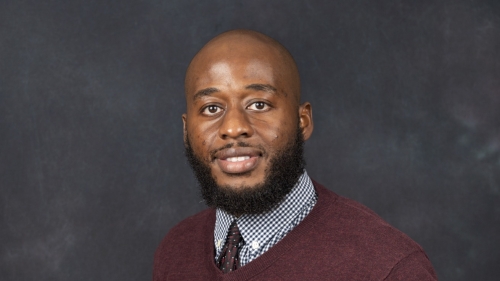
Elvis Gyan, M.A., M.Div., is a Ghanaian-American born and raised in Newark, New Jersey. He is a follower of Christ, educator, leader, brother, son, friend, and speaker. Elvis has a deep passion for understanding better structural factors that create barriers to the well-being of African Americans. Elvis is passionate about educating marginalized populations through better, culturally sensitive, socially just, transformative, and non-Eurocentric relationship education services. Elvis also consults for several organizations in the government sector, nonprofit sectors, and academia. Elvis is pursuing a Ph.D. in Family Science and Human Development at Montclair State University. He plans to focus on African American individuals' and couples' health through a social determinant of health framework. When Elvis is not working, reading, or writing, you can find him engaging in anything fitness-related or eating joloff rice.
My research looks to address two gaps. First, Eurocentricity does not consider a critical social justice lens, such as the influence of community context on Black/African American individuals and relational health. However, as stated by the World Health Organization (2003), the conditions in which people live, grow, and age, taken together as a community context, are essential to Black/African American overall health. Additionally, Eurocentricity does not include a critical social justice understanding of Black/African Americans and fails to consider social determinants of health, as the World Health Organization expresses. Secondly, Eurocentricity fails to consider a critical social justice lens of the impact of class and structural barriers (e.g., racism, discrimination, economic instability) that Black/African Americans encounter and how these barriers may impede individual and relational health promotion. Intervention services and relationship education programs often are Eurocentric in their theorizing and design. However, these programs and services use a Eurocentric lens to theorize Black/African American relational health. These are two significant gaps in research on Black/African American individuals and relational health.
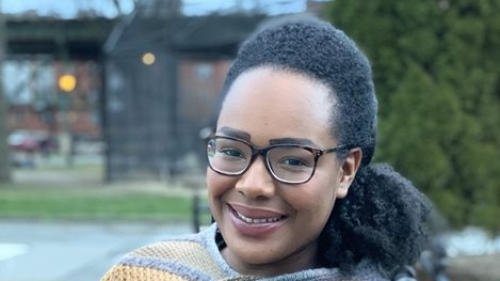
Gina (Diagou) Sissoko is a doctoral candidate in the clinical psychology program at John Jay College and the CUNY Graduate Center. She earned a bachelor’s degree in psychology and women, gender, and sexuality studies from Hunter College. Gina works under the advisement of Dr. Kevin Nadal, and her research focuses on the impact of colorism, gendered racism, and trauma on Black women and girls’ mental health and criminal legal involvement. Her dissertation is a critical participatory action research project focused on the impact and manifestation of colorism among Black adolescent girls. Gina is an NSF Graduate Research Fellow and a NASEM Ford Foundation Pre-doctoral Fellow. In 2021, she was recognized with the Distinguished Student Diversity Award by the Society of Clinical Psychology for her contributions related to diversity in clinical science training, service, and research. At CUNY, Gina served as the diversity chair in the clinical program at John Jay from 2019-2021, founded the CUNY Diversity Science Initiative, and currently serves as a diversity student representative to the Graduate Center psychology department. As part of her clinical training, Gina has worked in forensic assessment, substance use, child and adolescent psychiatry, and most recently, child welfare settings. Starting in July 2023, Gina will complete her predoctoral clinical psychology internship training year at the University of Illinois-Chicago. Gina was born and raised in Hamburg, Germany, and is the daughter of Malian immigrants. Since 2012, she has been a proud resident of the Bronx, New York.
Gina’s scholarship centrally examines the intersecting effects of colorism and gendered racism, structural oppression, and gender-based violence on mental health and criminal legal involvement among Black women and girls. She has authored several quantitative, qualitative, and conceptual peer-reviewed papers and book chapters, including on the impact of skin tone-related variables on mental health outcomes, the role of colorism on the criminalization of Black girls, microaggressions against racial minority immigrants, and mothering within the criminal legal system. Her work has been supported by several internal and external grants and fellowships, including the National Science Foundation Graduate Research Fellowship and the Ford Foundation/National Academies of the Sciences, Engineering, and Medicine. Gina employs a variety of methods steeped in traditions of Black Feminist methodology and liberatory praxis. For example, her dissertation employed a critical participatory action research framework to study the manifestation and impact of colorism on Black adolescent girls. Over six weeks, ten adolescent girls served as her co-researchers, and together, they developed a research protocol, collected data, and produced a Zine to distribute the findings to stakeholders. Through this type of work, Gina aims to pursue a career focused on developing an evidence base for gender-, race- and trauma-informed healing interventions and policy.
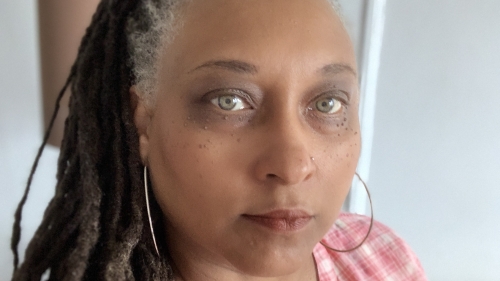
Tammie L. Swopes is a Doctoral Candidate at New York University in the Educational Theatre program - Steinhardt School of Culture, Education and Human Development. Born and raised on the South Side of Chicago, her dreams of working in the arts were crushed by the realities of lack of resources and opportunities for artistic pursuits. However, after having received a BA in Speech Communications from the University of Illinois at Urbana-Champaign, and a brief stint studying Aesthetic Education at UIUC, she started her theatrical career as an intern at the Alliance Theatre Company in Atlanta, GA. Tammie immersed herself in the art and business of Theatre which further inspired her work with youth, social justice, and community building. Her work with organizations such as the Performing Arts Program for Youth (PAPY), The Names Project Foundation, and The Partnership for Arts in Learning inspired her to move to NYC and study at NYU, where she earned an M.A. in Educational Theatre working and studying with some of the fields most notable practitioners. She has gone on to work as a Teaching Artist, Arts in Education Specialist, Theatre program director, and a full-time Performing Arts Instructor (working primarily in the South Bronx). Tammie is currently an adjunct professor at New York University (Program in Educational Theatre and Tish Drama), Marymount Manhattan College, and CUNY’s program in Applied Theatre. She is also a Career Coach for Wasserman Center’s Creative Career Hub and an Artistic Associate for the Verbatim Performance Lab (VPL) at NYU, where her work is centers on disrupting and dismantling systems of oppression through projects that illuminate implicit bias. Through her work with VPL she has received the NYU Steinhardt Champions of Equity Award (You’ve Got To Be Brave, Brave, Brave), as well as the NYU Steinhardt Diversity Innovation Grant (The Serena William’s Project). She is also the recipient of the Nancy and Lowell Swortzell Permanent Fund in Educational Theatre Scholarship, and the Elle Mae Mullavey Adler Scholarship, both for academic excellence. Tammie’s research interests are deeply rooted in art as activism, as is evidenced in her work done with youth, as well as her current research which seeks to decolonize theatrical and academic spaces through a community-centered process utilizing principals and praxis in artivism. Her work challenges standard theatrical practices and ways of being that are steeped in white supremacist ideology and have become the model for theatre-making. She believes that theatre is a space to “freedom dream” the world we want, and to not only “rehearse for the revolution,” as Augusto Boal would say, but to begin to dismantle systems of oppression by creating a community built on revolutionary acts of joy.
I’m not sure how I originally came upon the term Artivist, but as soon as I heard it, I knew that’s where I would find my life’s work, my art, my joy, my community, my world - the artist as activist. But did this term only apply to the intention of an artist’s work or could it apply to the process of creating art and for me creating community spaces where artivism thrives? Then I remember something I was told years ago when I first started doing community-engaged work – “there is an art to making art happen!” And so here is where I begin. While the term artivism has become common amongst community-engaged artists, there is a lack of agreement on what the term means and how it fits into present activist movements. For years now artivism has been emerging in my practice and has become a way of knowing and engaging with, art (theatre), artists, and the community at large. The purpose of this study is to examine the way(s) in which artivism can be useful pedagogy in creating equitable and inclusive theatrical and educational spaces and ways of working. This autoethnographic study utilizes arts-based research methodology as a means to gather and evaluate data. The play and rehearsal process, will serve as the springboard for the intentional creation of work that utilizes not only applied theatre methods, but artivist methodology in centering the script and the community of artists that will bring this play to life. I will study myself and my praxis of facilitation in a directorial role as we (the artists involved) undergo the process of mounting this work. The study examines how I will uplift the work of not only the playwright, but all artist involved in the project, thereby creating a more just space where community, trust, and healing are at the center of the work. I am also looking for replicable ways of working and offerings that others will be able to use moving forward.
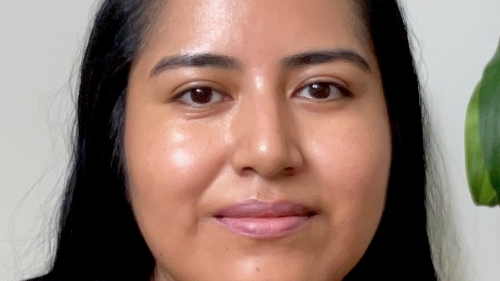
Rocío León is a Doctoral Candidate in the American Studies and Ethnicity program at the University of Southern California, where her training has focused on Latinx media studies, globalization, visual culture, and humor studies. Her dissertation, “Latinidad Goes Global: Digital Television Cultures in the U.S. and Mexico” analyzes the dialogical and cultural strategies within tropes, myths, social structures, and discourses prevalent within Latinx digital culture and their genealogy within global television industries in the U.S. and Mexico. She pays specific attention to how social discourses and ideologies in the programming of networks and companies like HBO, Mexico’s Televisa, and Netflix Latin America transfer and transform across mediums by social media users. Her work has appeared in Spectator and Information, Communication, & Society. Rocío has also presented her research at the American Studies Association, American Association of Geographers, American Sociological Association, and the National Association of Chicana and Chicano Studies. In 2022, she received the Society for Cinema and Media Studies Humor and Comedy Studies Special Interest Group Graduate Student Paper Award for her dissertation chapter, “Immortal in Spanish: The Digital Afterlife of Soraya Montenegro.”
In a 2016 Vanity Fair México YouTube video, the Mexican actress Itati Cantoral trains viewers on how to be the villana perfecta [perfect f. villain]. She performs the transgressive behaviors she enacted as Soraya Montenegro in María la del Barrio (1995-6). Like all telenovela villanas from Grupo [Group] Televisa, the mass media company that created her, Soraya experiences a gruesome death at the end of the melodrama. In the mid-2010s, U.S. Latinx social media users revived her through memes, video bits, and gifs that continue to circulate on Facebook, Instagram, and TikTok. Soraya’s “Cries in Spanish” meme travels across the internet because of the same scripts that Televisa used to mark her as a villain: revealing clothes, uncontrollable emotions, and relentless ambition. Today, this translates to fashionable, rebellious, and unstoppable. My dissertation “Latinidad Goes Global: Digital Television Cultures in the U.S. and Mexico,” analyzes the cultural strategies that transnational television companies and networks use to ascribe affinities, myths, and identities to Latinidad. In the U.S., Grupo Televisa influences programming through the leading Spanish-language network, Univision. In Mexico, U.S. programming has been available through cable, satellite, and now digital streaming subscriptions. In 2011, Netflix Latin America began its initiative to expand its services to international audiences in Mexico. My research questions are: How does the dominance of companies like Televisa and HBO in both countries influence expectations for the representation of contemporary social experiences on digital television? How do social media platforms such as TikTok facilitate cultural exchanges and dialogue between audiences separated by nation? I analyze the dialogical relationship between English and Spanish legacy television, specifically the social structures that characterize how companies like Televisa and HBO have branded themselves across the American hemisphere. Televisa’s archaic programming is reflective of its gender binaries, lack of diversity, and oligarchic business practices. In contrast, networks such as HBO are imbued in discourses of realistic and progressive representations of LGBTQ+, feminist, and creative storylines that in turn are reflective of contemporary social experiences. I make two key findings that contribute to Latinx media studies, cultural studies, and digital studies. First, recent literature highlights the bilingual and bicultural influences of U.S. Latinx millennials’ social media use (Avilés-Santiago 2022; Gutiérrez 2021; Casillas, Hinojos and Zarate 2022). Through an audiovisual analysis of memes, TikTok challenges, and other social media user-generated content, I argue that Latinx digital culture includes Mexican social media users and their creative exchanges with U.S. Latinx as they circulate and transform content such as the “Cries in Spanish” meme. Second, recent scholarship on Netflix Latin America (NLA) emphasizes how the streaming platform and praise for its Spanish-language series continue the Eurocentrism of Mexican television and classed spectatorship dynamics (Llámas-Rodriguez 2020; Straubhaar 2021). Based on my review of online interviews with directors and cast members, and thematic analysis of NLA series, I argue that the historical presence of American cable television has an equal if not more powerful ideological basis for the narratives of these series as well as critics’ and audiences’ positive reception.
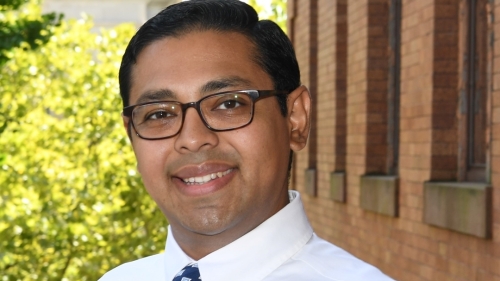
Juan Cortes is a fourth-year Ph.D. student at the Johns Hopkins School of Education and a Graduate Research Assistant at the Baltimore Education Research Consortium (BERC). His research focuses on the application of advanced quantitative methods to improve student’s academic trajectories through secondary education and access to postsecondary education, especially for minoritized and underrepresented populations. Juan’s current work involves improving early-warning indicators to better identify students in need of support and developing measures of geospatial access to postsecondary institutions across urban- and state-level contexts. Prior to pursuing his Ph.D., Juan conducted research and program evaluation work in K-12 public school systems, first in Cleveland Metropolitan School District where he served as a Data Fellow through Harvard’s Strategic Data Project Fellowship and most recently in Baltimore County Public Schools. He holds a master’s degree in education from the Harvard Graduate School of Education and a bachelor’s degree in philosophy from the Catholic University of America.
Research Introduction: Examining Early-Warning/On-Track Indicators for Middle Schools Juan Cortes Over the past 20 years, we have utilized early-warning indicators (EWIs) to identify students early in their educational trajectory to provide timely interventions that support students on their path toward high school graduation (Balfanz & Byrnes, 2019). Yet, a substantial proportion of students do not graduate on time and they are disproportionately low-income, minoritized, and English learners (DePaoli et al., 2018; Hussar et al., 2020). Research suggests that the ninth-grade year is key to success in high school (Roderick et al., 2014). As such, EWI work continues becoming more widespread in middle grades which raises questions of whether indicators well established in the literature (Allensworth & Easton, 2007; Bruce et al., 2011) can simply be ported over into middle school and implemented in the same fashion. To address these questions, my research focuses on the three components of an EWI: i) the choice of educational outcome, ii) the measures predicting that outcome, and iii) the thresholds used to identify students in need of support. Utilizing Receiver-Operating Characteristic (ROC) analyses and metrics of classifier performance, I compare how EWI measures perform when predicting different operationalized outcomes for middle school. My results show that: i) the choice of outcome is non-trivial and should be carefully considered, ii) attendance and course grades perform best on classifier performance metrics and provide meaningful differentiation considered together, and iii) categorizing students using a single threshold has tradeoffs for providing a strong signal; I propose a two-threshold approach.
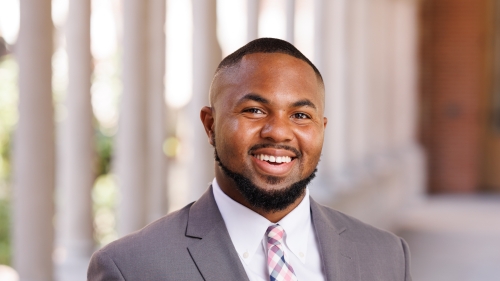
Isaiah Simmons (he/him) is a native of Virginia Beach, VA who received his undergraduate degree in Psychology from the College of William and Mary. Isaiah also graduated with his MPP from the University of Southern California where he is currently a PhD candidate in Urban Education Policy. Isaiah's previous educational experience involves 5 years of work with the Virginia Beach City Public Schools working with middle and high school students teaching leadership skills. Isaiah’s research interests focus on how narratives influence policy development and implementation, how those narratives can be used to oppress minoritized populations as well as the lived experiences of policy. Isaiah’s interests also consist of the influence of the culture of sports in the academic environment. In his spare time, Isaiah enjoys watching and playing basketball, as well as attending concerts and trying new restaurants.
When I began my internship with the University of Southern California’s (USC) Race and Equity Center, I was initially skeptical about pursuing a career in research. I thought of research as a cold, non-engaging process that had little practical impact on the campuses producing the research or the world at large. In 2019 though, I experienced a foreshadowing of the kind of career I wanted to have as a researcher with a report I co-authored entitled: Black Students at Public Colleges and Universities: A 50-state Report Card. The report was generally well received and after its publication, I participated in several media opportunities in order to discuss the report including radio interviews, op-eds, and perhaps most importantly, engaging with practitioners personally. In November 2019 I was invited to St. Louis, Missouri to present at a racial equity workshop conducted by the St. Louis Graduates organization. At this town hall, I spent two days presenting on the report and answering questions from administrators, faculty members at various institutions. I found joy in this experience in St. Louis and with the report in general that was formative to my development as a scholar and researcher; I was able to discuss the work with others instead of writing at them, I was able to have local contexts inform how I would write in the future to focus on implementation, and lastly I was able to write in ways that empowered faculty, students, and community members. These are all traits I want to carry with me as I progress as a researcher and eventually as a faculty member. The lessons learned from my work on the 50 state-report card have informed the rest of my graduate career profoundly, as well as my research agenda. My current dissertation examines the evolution of Name, Image, and Likeness (NIL) policies in college sports and how the narratives around these policies will impact collegiate athletes, as well as higher education institutions. This topic allowed me to merge my interests in higher education, college athletics, as well as policy implementation, while also discussing a topic that can be easily communicated to the public with implications for a variety of stakeholders. My aim is for my dissertation to set the foundation for my future research agenda by focusing on policy narratives and equitable policy implementation in various areas of sports management. Throughout my research, I am committed to pursuing equity and social justice, I feel by examining the stories around policies I can expose how various biases have informed the policies that have concretized oppression for various groups of people both from a legislative standpoint, as well as with institutional practices within sports management My enthusiasm for research began after realizing that research can be public-facing, not just confined to the academy and the world of peer-reviewed journals, I aspire to do that as a faculty member; being able to navigate the world of journals, while also doing work that speaks to the current practitioner and the aspiring learner.
